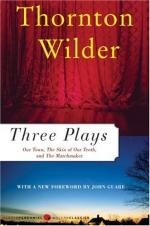|
This section contains 438 words (approx. 2 pages at 400 words per page) |
Thornton Niven Wilder was born in Madison, Wisconsin, on April 17, 1897, the only survivor of twin brothers. His mother, the daughter of a minister, and his father, a strict, moody newspaper editor, both had a strong influence on the view of the world that he would eventually develop. In 1906, his father joined the foreign service as a consular general to Hong Kong. The entire family moved there with him, but after six months Wilder's mother took the children and moved back to the United States, living in Berkeley, California. When his father transferred to Shanghai, Wilder returned to Asia and attended German and Chinese schools before returning to the United States once more to finish high school in Berkeley.
When his father enrolled Wilder in Oberlin College in Ohio, Wilder was disappointed, having hoped to attend Yale. He found that the small college atmosphere suited him, however. Several of his works were published in the student magazine, and he came to know professors on a personal level. He transferred to Yale for his last two years, which were interrupted by a short tour of service in the Coast Artillery Corps, the only branch that would accept him because he was severely nearsighted. Returning to Yale, he had his first full-length play published in serial form in the Yale Literary Review before graduating in 1920. He received his master's degree in French literature from Princeton in 1926.
In 1926, his first novel, The Cabala, was published, and his first play, The Trumpet Shall Sound, was produced. The following year, his life was changed forever when his second novel, The Bridge of San Luis Rey, became a sensation, selling millions of copies and winning the Pulitzer Prize. After that, he taught part-time, taking visiting professorships at Harvard, the University of Chicago, and the University of Hawaii; and he wrote, alternating between novels and dramas.
In 1938, Wilder won a second Pulitzer Prize for his play Our Town, making him the only American to ever win Pulitzers for both fiction and drama. Every year, Our Town is still one of the most often-produced plays. He won a third Pulitzer, in drama, for 1942's The Skin of Our Teeth.
Wilder served in the Air Force during World War II, earning the Legion of Merit and the Bronze Star. After the war, he wrote less, and his new works were greeted with less enthusiasm by critics, but his place in American literature was already firmly established. He died in December 1975, in the house in Connecticut where he had lived for years with his sister, who served him as secretary, literary advisor, and business manager.
|
This section contains 438 words (approx. 2 pages at 400 words per page) |




